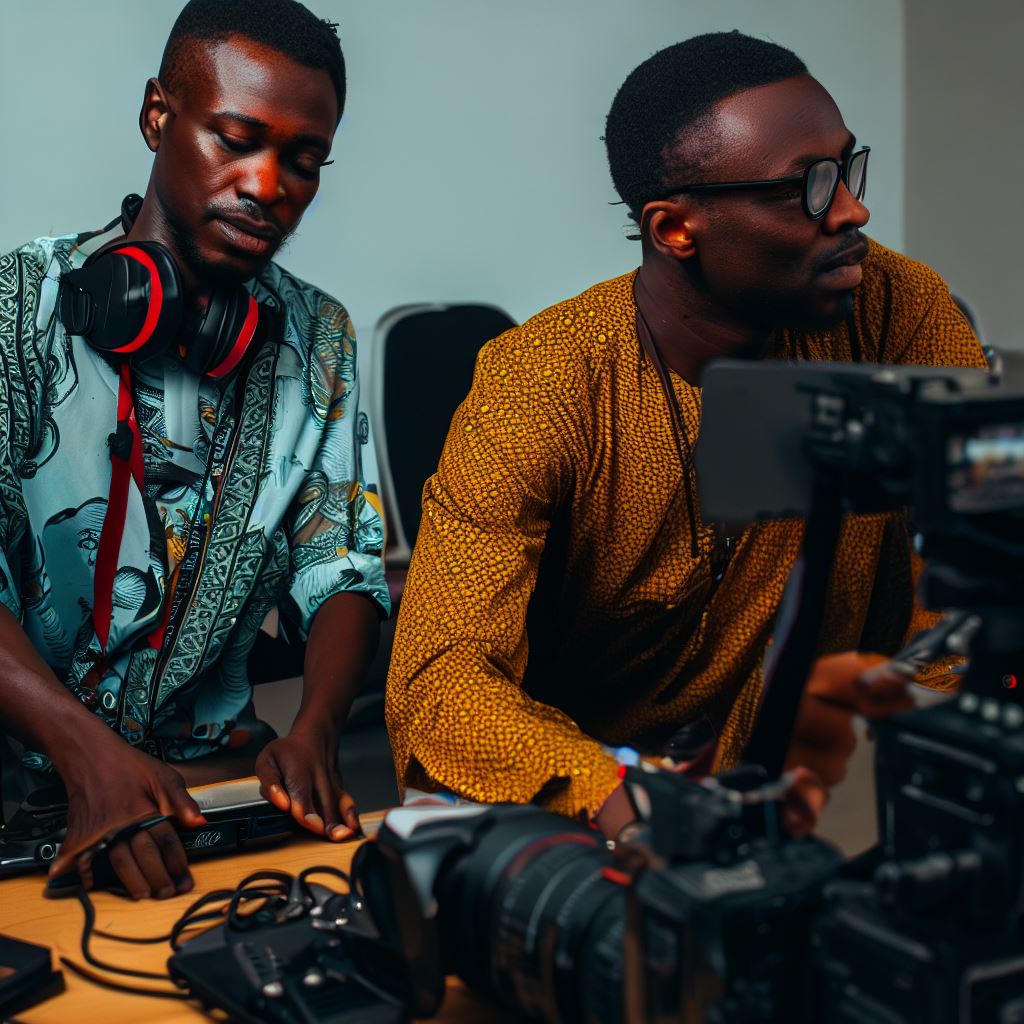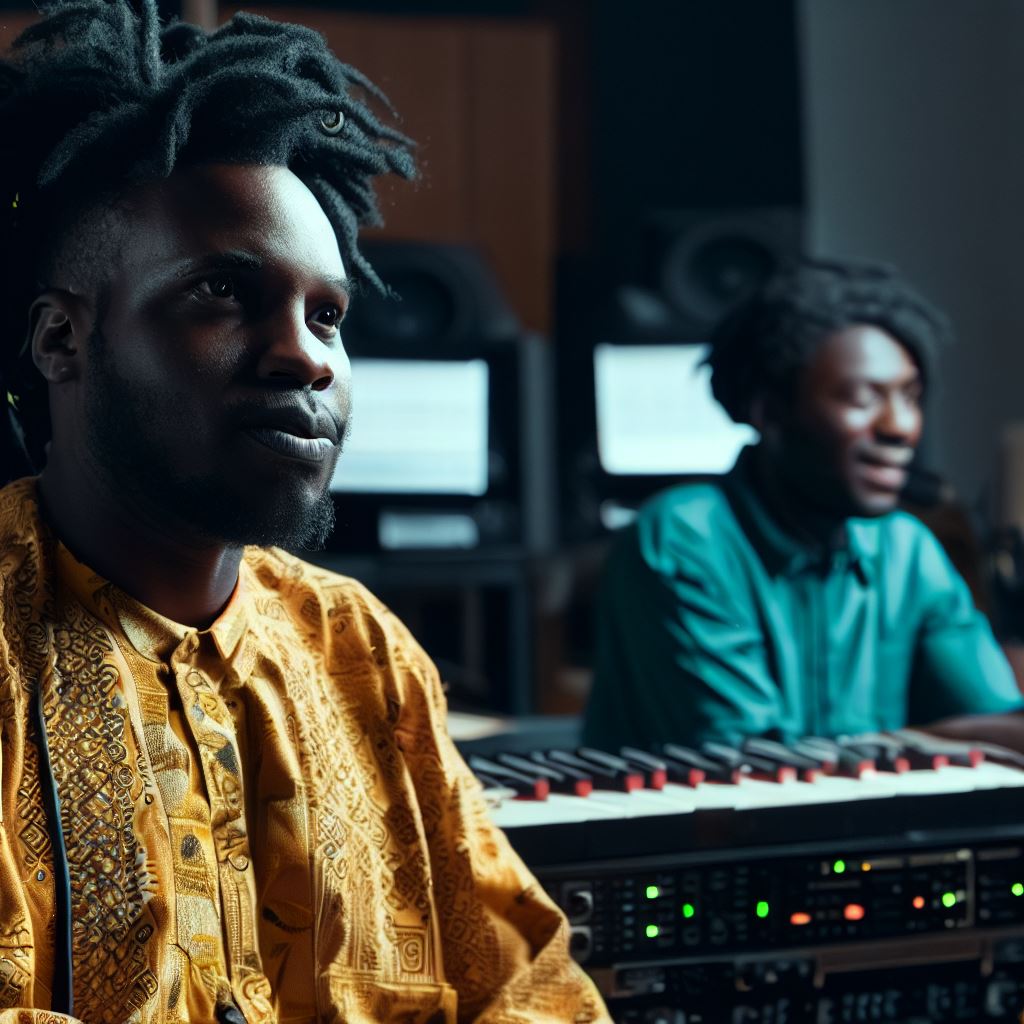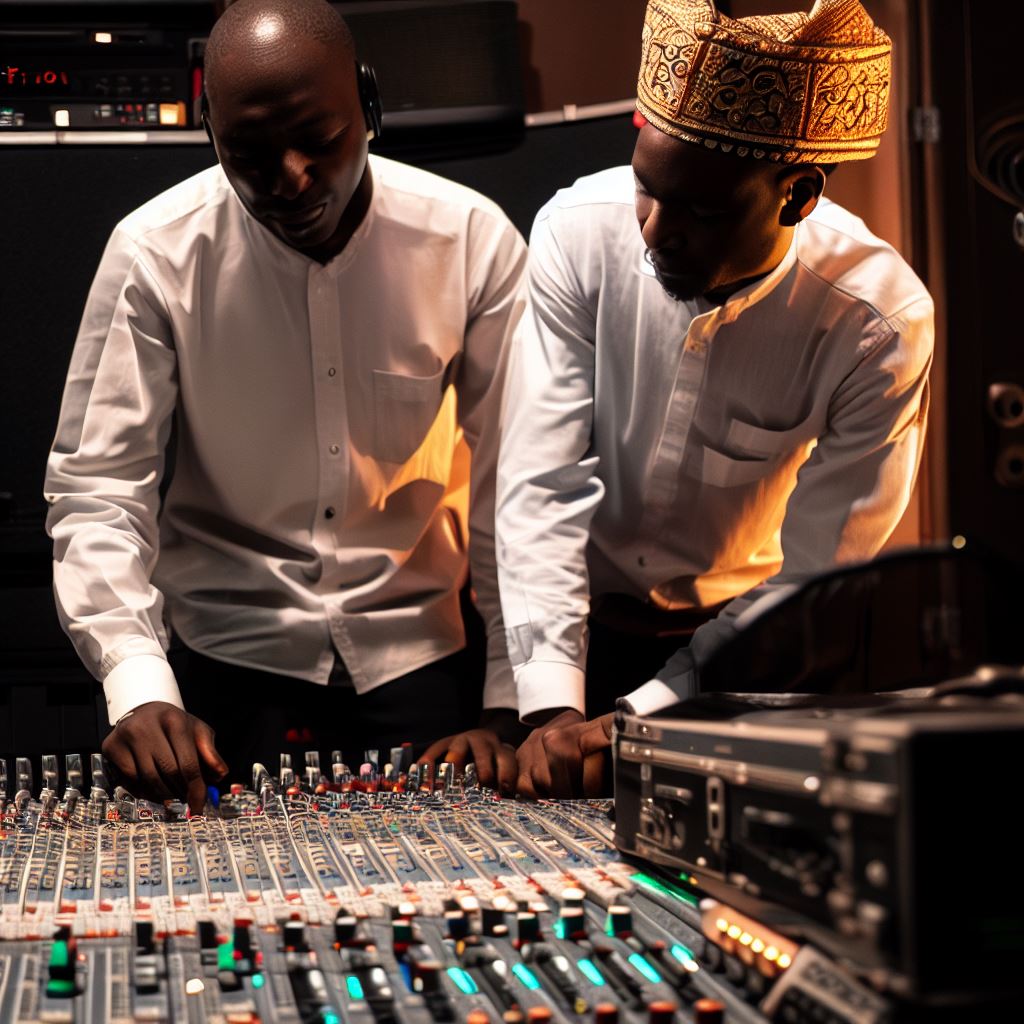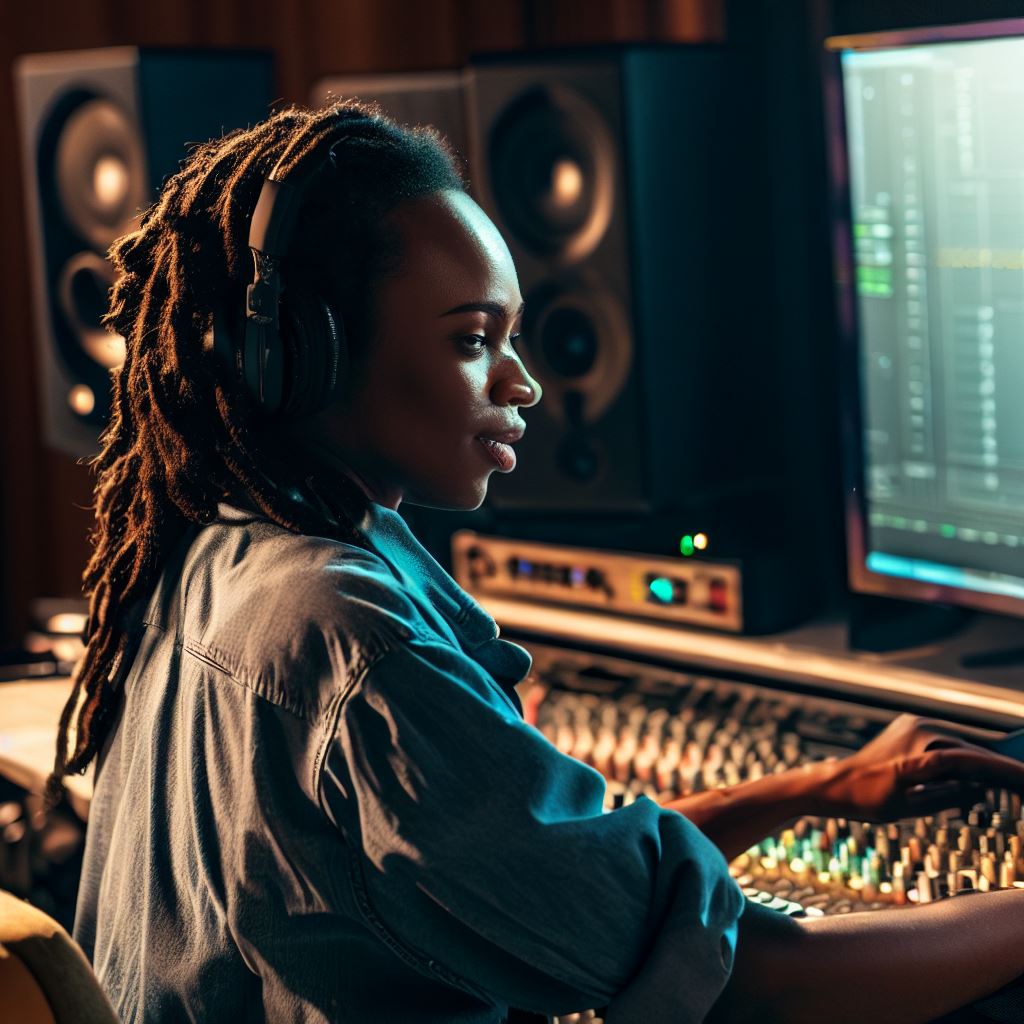Introduction
The concept of traditional music
Traditional music is a form of music that has been passed down through generations in a specific culture or region.
Overview of Nigerian film scores and their significance
Nigerian film scores are the musical compositions created specifically for Nigerian movies, playing a vital role in enhancing the cinematic experience and storytelling.
How traditional music influences Nigerian film scores
This section explores the influence of traditional music on Nigerian film scores, highlighting the cultural significance and impact on the movie industry.
Traditional Music in Nigerian Culture
Diversity of Nigerian traditional music
- Nigeria is home to over 250 ethnic groups, each with its unique musical traditions.
- From the Yoruba to the Hausa, Igbo, and many more, Nigerian traditional music varies greatly.
- These diverse musical styles reflect the rich cultural heritage and history of the Nigerian people.
- Traditional music serves as a medium for storytelling, cultural preservation, and social cohesion.
Historical roots and cultural significance of traditional music in Nigeria
- Traditional music in Nigeria has deep historical roots, dating back centuries.
- It evolved through oral traditions, influenced by religious, social, and political practices.
- This music played a vital role in celebrating births, weddings, funerals, and other important occasions.
- Traditional music also served as a means of communication, transmitting messages across communities.
- It reflects the values, beliefs, and identities of various Nigerian ethnic groups.
Various genres and instruments used in traditional Nigerian music
- Nigerian traditional music encompasses a wide range of genres, each with its distinct characteristics.
- Some popular genres include Juju, Highlife, Apala, Fuji, Waka, and Afrobeat.
- Traditional Nigerian music often combines rhythmic patterns, melodies, and call-and-response vocals.
- Various instruments are used, such as the talking drum, shekere, agidigbo, ogene, and udu.
- The sound of these instruments adds depth and authenticity to traditional Nigerian music.
In general, traditional music holds significant importance in Nigerian culture. It serves as a representation of the country’s diverse heritage and acts as a powerful tool for cultural expression and communication.
With its wide range of genres and unique instruments, traditional Nigerian music has made a lasting impact on the Nigerian film industry.
It has influenced and inspired film composers, who incorporate traditional elements into their scores to create a rich and authentic cinematic experience.
The fusion of traditional music and Nigerian film scores not only showcases the country’s cultural identity but also contributes to the global recognition and appreciation of Nigerian artistry.
Read: Breaking Down the Film Composer Salary in Nigeria
Traditional Music’s Influence on Nigerian Film Scores
Traditional music plays a crucial role in shaping the essence and identity of Nigerian film scores.
Nigerian cinema, commonly referred to as Nollywood, has gained international recognition in recent years due to its unique storytelling techniques and the incorporation of traditional music into film scores.
Integration of traditional music into film scores
The integration of traditional music into film scores is an essential aspect of Nigerian cinema.
By infusing these distinct musical elements, filmmakers aim to connect with the cultural heritage of their audience.
Traditional music serves as a vehicle for storytelling, enhancing the emotional impact of scenes and creating a strong sense of authenticity.
- Traditional music elements commonly incorporated in Nigerian film scores. These include pulsating rhythms, melodic patterns, and traditional instruments like the talking drum, xylophone, and shekere. These elements provide a distinctive African sound that resonates with the Nigerian audience.
- How the use of traditional music enhances storytelling aspects of films. It helps in conveying emotions, establishing the setting, and creating a sense of place. For example, in a scene depicting a traditional festival, the rhythmic beats and lively melodies of traditional music can capture the energy and excitement, transporting the viewers to the heart of the celebration.
Role of traditional music in establishing the mood and atmosphere of Nigerian films
Traditional music plays a significant role in establishing the mood and atmosphere of Nigerian films.
It sets the tone, creating a connection between the visuals and the cultural context.
Impact of traditional music on character development and cultural representation
- Traditional music’s impact on character development and cultural representation is profound.
- It helps in portraying the depth and complexity of characters and serves as a means of cultural representation.
- For instance, the choice of specific traditional music for a character belonging to a particular ethnic group conveys the character’s roots, values, and identity.
In addition, the integration of traditional music in Nigerian films contributes to preserving cultural heritage.
It acts as a medium through which younger generations can connect with their traditions and learn about their cultural roots.
By showcasing traditional music, Nigerian films play a crucial role in cultural preservation and education.
In essence, traditional music significantly influences Nigerian film scores.
Its integration adds authenticity, enhances storytelling, establishes the mood and atmosphere, and contributes to character development and cultural representation.
Traditional music serves as a vibrant thread that weaves the richness of Nigeria’s cultural heritage into the tapestry of Nigerian cinema.
Read: Exploring the Role of Film Composers in Nollywood
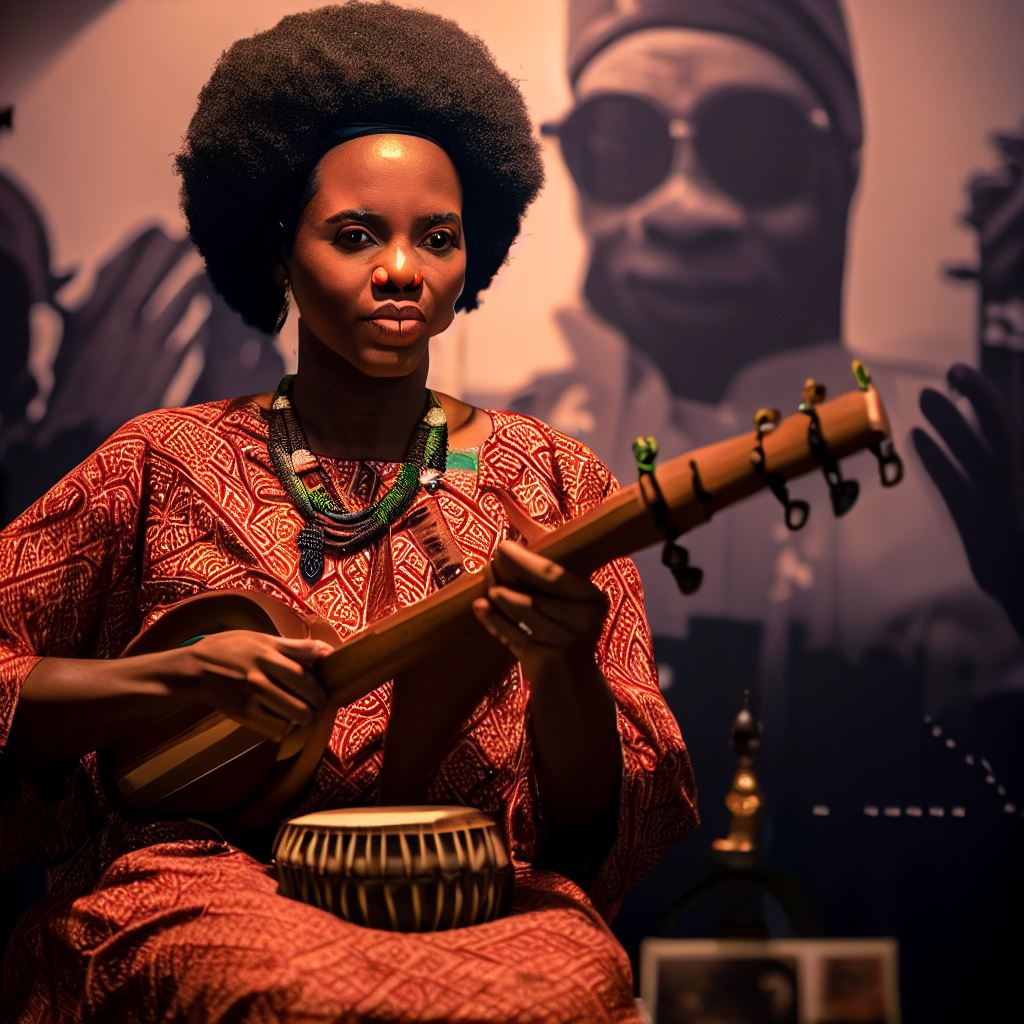
Find Out More: Freelance vs Agency: Pros and Cons for Nigerian Costume Designers
You Might Also Like: Costume Design Education: Top Schools in Nigeria
Success Stories: Notable Films and Composers
Influential Nigerian films that prominently feature traditional music
1. The films’ plots and themes
- Nigerian cinema has witnessed the integration of traditional music into film scores, contributing to the success of several influential films.
- These movies often delve into themes of culture, identity, and societal issues, while traditional music serves as a powerful tool to effectively convey emotions and create an immersive experience for the audience.
- One notable film is “The Wedding Party,” which explores the vibrant and joyful atmosphere of traditional Nigerian weddings.
- It follows the love story of Dunni and Dozie, navigating the challenges of merging their different cultural backgrounds.
- The film’s soundtrack incorporates traditional music, adding authenticity and elevating the celebratory ambiance of the wedding scenes.
- Another groundbreaking film is “Lionheart,” directed by Genevieve Nnaji.
- This movie tackles gender inequality and women empowerment in Nigerian society.
- Nnaji masterfully incorporates traditional music throughout the film, using it to emphasize cultural heritage and evoke a sense of pride and unity among the characters.
2. Specific scenes where traditional music plays a crucial role
- In “The Wedding Party,” the scene where the wedding ceremony takes place showcases the power of traditional music.
- As the couple exchanges vows and traditional rituals are performed, the music intensifies, reflecting the emotional depth of the moment and enhancing the cultural significance of the scene.
- In “Lionheart,” the opening scene where the protagonist, Adaeze, drives through the bustling streets of Lagos while traditional African music plays in the background sets the tone for the entire film.
- The rhythm and energy of the music mirror Adaeze’s determination and resilience in navigating the male-dominated business world.
Renowned Nigerian composers known for incorporating traditional music into their scores
1. Background information on their careers and achievements
- In Nigeria’s film industry, several talented composers have made their mark by seamlessly blending traditional music with contemporary elements in their scores.
- One such composer is Michael “The Master” Odiong, who has worked on numerous successful films.
- Odiong’s expertise lies in fusing traditional African rhythms with modern orchestration, creating captivating and unique sounds that truly enhance the cinematic experience.
- Another notable composer is Tunde Jegede, renowned for his mastery of traditional Nigerian instruments such as the kora and the ngoni.
- He has composed for various films, infusing his compositions with the rich sounds of these instruments, adding depth and cultural authenticity to the scores.
2. Unique approaches to blending traditional and contemporary elements
- Michael Odiong’s approach involves meticulous research and deep understanding of traditional music.
- He carefully selects the instruments and creates arrangements that complement the film’s narrative, seamlessly merging with modern sounds and instrumentation.
- Tunde Jegede, on the other hand, focuses on showcasing the versatility and beauty of traditional Nigerian instruments.
- By combining these unique sounds with contemporary harmonies and melodies, Jegede creates a harmonious balance between tradition and innovation, giving the film scores a distinct and captivating quality.
Overall, the integration of traditional music in Nigerian film scores has yielded tremendous success.
By showcasing influential films that prominently feature traditional music and introducing renowned composers known for their ability to blend traditional and contemporary elements, Nigerian cinema continues to captivate audiences with its rich cultural heritage and innovative musical composition.
Read: Top 10 Most Influential Nigerian Film Composers
Challenges and Future Directions
Integrating traditional music into Nigerian film scores poses certain challenges and requires strategic planning.
This section aims to identify potential obstacles and discuss strategies for overcoming them.
Potential obstacles in integrating traditional music into film scores
1. Commercial considerations and audience reception
- One of the main challenges in incorporating traditional music into film scores is the need to cater to commercial considerations and appeal to a broad audience.
- Traditional music may not always align with popular preferences, potentially limiting its use in mainstream films.
- Filmmakers and composers must strike a balance between cultural authenticity and commercial viability.
2. Limitations in preserving the authenticity of traditional music
- The incorporation of traditional music into film scores may face limitations in preserving its genuine essence.
- Adapting traditional music to fit within the context of a film can lead to alterations that dilute its authenticity.
- It is crucial to find ways to maintain the integrity of traditional music while still serving the narrative of the film.
Possible strategies for overcoming challenges and expanding the influence of traditional music in Nigerian film scores
1. Propose collaborations between traditional musicians and film composers
- To overcome the challenges mentioned above, collaborations between traditional musicians and film composers can be an effective strategy.
- By working together, they can find ways to incorporate traditional music authentically while still creating a compelling film score.
- This collaboration can lead to the fusion of traditional and modern elements, appealing to both cultural enthusiasts and wider audiences.
2. Further research and educational initiatives to explore the potential of traditional music
- To expand the influence of traditional music in Nigerian film scores, it is vital to invest in research and educational initiatives.
- These efforts can help develop a deeper understanding of the cultural significance of traditional music and its potential within the film industry.
- By fostering a stronger appreciation for traditional music among filmmakers, composers, and audiences, its integration into film scores can become more prevalent and impactful.
In general, integrating traditional music into Nigerian film scores faces challenges related to commercial considerations, audience reception, and preservation of authenticity.
However, by proposing collaborations between traditional musicians and film composers and investing in research and educational initiatives, these challenges can be overcome.
The influence of traditional music in Nigerian film scores can then expand, enriching the cinematic experience and preserving the cultural heritage of Nigeria.
Read: Nollywood: Understanding Nigeria’s Film Music Landscape
Conclusion
The influence of traditional music on Nigerian film scores
Traditional music has had a significant influence on Nigerian film scores, enriching the cinematic experience.
The cultural significance of this integration
The integration of traditional music in Nigerian cinema emphasizes the cultural significance of this art form.
Encourage future exploration and appreciation of traditional music in Nigerian cinema.
Moving forward, it is important to explore and appreciate traditional music further in Nigerian cinema to preserve its essence.

